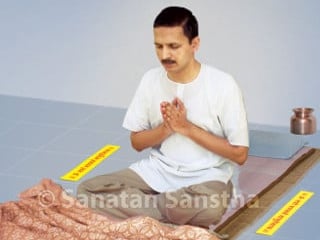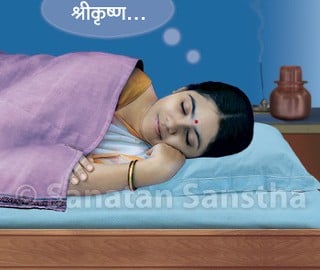Sleep is as essential as food for physical and mental well being. Body and the organs wearout after a day’s work. To restore them to the original levels, rest is essential. The natural state of rest is sleep. Happiness-sorrow, obesity-leanness, knowledge-ignorance, health and strength are all dependent on sleep.
With the increase of stress globally in recent years, people would do anything to catch up on some sleep; be it simply sleeping to while away time or cover up for lost hours of sleep. Have we ever pondered that how does this activity actually provide us strength and energy to carry on? We might have a scientific idea behind the process but spiritual basis is also responsible for providing us the required sleep. Let us read this article and find out the reality.
1. Origin and meaning of the word ‘nidra (Sleep)’
A. Origin
According to the Purāṇas (the eighteen sacred Holy texts compiled by Sage Vyas), nidra is the feminine form of Deity Brahma and it originated from the churning of the celestial ocean.
B. Meaning
‘मेध्यामनःसंयोगः’, meaning, the union of naḍi (Energy channel) named ‘medhya’ and the mind is termed as nidra.
C. Satej nidra
Due to appropriate diet a jiva progresses towards good sleep. This itself is called ‘Satej nidra’. During sleep when the subconscious mind has sāttvik (Sattva predominant) thoughts, at that time also the sadhana (Spiritual practice) of the individual goes on in the subconscious mind. Due to this sadhana, the individual’s mind becomes pure and it becomes easier for him to achieve dissolution of the mind.
2. Duration of sleep
The duration of sleep varies with age, triguṇas (The three basic components of Sattva (One of the three components in the universe, signified by purity and knowledge), Raja (One of the three basic components in the universe, signified by activity, passion), and Tama (One of the three components in the universe, signified by inertia and ignorance) and prakruti (Basic nature or personality) of an individual.
A. According to age
Sleep of 10 to 12 hours per day for children, 8 hours for youth, 7 hours for adults and 4 to 6 hours for the aged is essential.
B. According to trigunas
Sleep of 4 to 6 hours per day for sāttvik individuals, 8 hours for rājasik (Raja-predominant) individuals and 10 to 12 hours for tāmasik (Tama-predominant) individuals is essential.
C. According to prakruti
1. An individual who has vata (Air) prakruti does not get peaceful sleep. He is restless during sleep and his sleep gets disturbed even at the drop of a pin.
2. An individual who has pitta (Bile) prakruti does not get peaceful sleep. He requires 8 hours of sleep everyday.
3. An individual who has kapha (Phlegm) prakruti gets peaceful sleep. He sleeps everyday for more than 8 hours.
3. Reasons for getting sleep and the related processes
1. Various movements of the body exhaust organs and they need rest. Sleep fulfils this need.
2. Process of thinking during the whole day exhausts the mind and the brain; they too need rest. Sleep fulfils this need. An individual who gets peaceful sleep, is oblivious to all happenings around him and he does not dream too.
3. When all the sense organs merge into the mind, meaning, when functioning of all the organs ceases, the individual falls asleep. At that time, he cannot hear, see or smell.
4. When the mind merges with the praṇa, meaning, with the breath, its functioning ceases and the individual falls asleep.
5. An individual who has a balanced diet and who is sufficiently active needs regular and sufficient sleep.
4. Place of sleep
The place where you sleep should be clean and peaceful. If it becomes necessary to sleep in a room occupied by the parents, Guru or elderly people, arrange your bedding in such a way that your feet are not towards them.
Source: Publication – How to sleep peacefully, published by Sanatan Sanstha.

 Sleep mantras to get peaceful sleep
Sleep mantras to get peaceful sleep Best sleeping direction
Best sleeping direction How to sleep better - Science underlying different sleeping position
How to sleep better - Science underlying different sleeping position Benefits of sleeping early at night and waking up early
Benefits of sleeping early at night and waking up early Sleep deprivation : Causes, symptoms and home remedies for sleep
Sleep deprivation : Causes, symptoms and home remedies for sleep